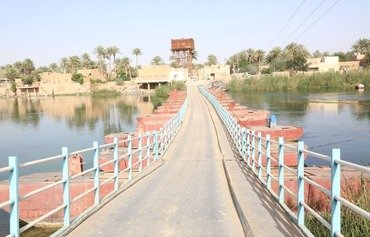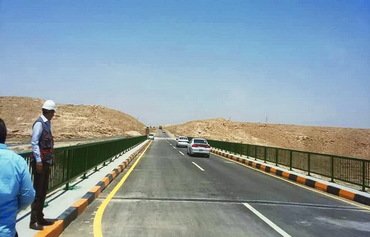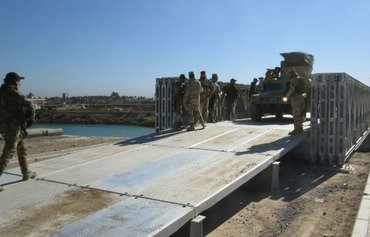The restoration of vital bridges that carry vehicle and pedestrian traffic over the Euphrates and link Ramadi and Fallujah with western Anbar is a sign that the province is leaving the "Islamic State of Iraq and Syria" (ISIS) era behind.
There has been a surge of reconstruction activity in Anbar cities as stability returns to the province and displaced residents return, local officials said.
"The stable security situation in Anbar has contributed significantly to the implementation of a massive reconstruction campaign," Anbar provincial council member Fahd al-Rashed told Diyaruna.
This includes the rehabilitation of damaged infrastructure, he said, including roads and bridges on the Euphrates that link Anbar cities to the international highway.
![Iraqi government forces gather on a newly built bridge in al-Hamidiyah area, north of Ramadi, on February 17th, 2016 after security forces retook the city from ISIS. [Moadh al-Dulaimi/AFP]](/cnmi_di/images/2019/09/03/19710-Hamidiyah-Ramadi-bridge-600_384.jpg)
Iraqi government forces gather on a newly built bridge in al-Hamidiyah area, north of Ramadi, on February 17th, 2016 after security forces retook the city from ISIS. [Moadh al-Dulaimi/AFP]
![Anbar schoolchildren play football in their school playground in al-Qaim on November 13th, 2018. [Ahmad al-Rubaye/AFP]](/cnmi_di/images/2019/09/03/19704-Iraq-Anbar-school-600_384.jpg)
Anbar schoolchildren play football in their school playground in al-Qaim on November 13th, 2018. [Ahmad al-Rubaye/AFP]
Reopened river crossings in Ramadi include the Palestine, Jordan Crossroad, Tamim and Japanese bridges, he said, which link the international highway to the western Anbar cities of Heet, Rawa, Anah, al-Qaim and al-Rutba.
Pedestrian bridges also have been constructed in al-Nassaf area west of Fallujah, Baghdad street in central Fallujah, and in the bridge area in al-Saqlawiyah, al-Rashed said.
In the near future, he added, the bridge in the western Anbar city of al-Baghdadi is slated for rehabilitation, as is the road that links Heet to Haditha.
This road continues through al-Qaim to the district of al-Rutba and the Iraq-Jordan border, he said.
''Anbar is witnessing a major construction boom in all sectors, including the service and industrial sectors," said al-Rashed, who attributed this growth to the elimination of ISIS and the establishment of security in liberated areas.
Multiple rehabilitation projects
"The government is directing its efforts towards the rehabilitation and reconstruction of service facilities and construction of hospitals and school buildings," Anbar provincial council member Athal al-Fahdawi told Diyaruna.
In Fallujah, he said, "the reconstruction campaign included the rehabilitation of railway, pedestrian and vehicle bridges", including al-Sajar bridge over the railway track in the northern part of the city.
Rehabilitation work also is under way on three railway bridges in al-Qaim, Heet and Area 210 on the international highway, he said.
"The ISIS terrorist gangs destroyed many service facilities and vital bridges," al-Fahdawi said, noting that of the more than 80 bridges the group damaged or destroyed, many have since been rehabilitated.
"Government efforts are continuing to implement other projects in co-operation with the Roads and Bridges Department and the municipalities, and with the support of international organisations and the Reconstruction Fund for Liberated Areas," he said.
These include the rehabilitation of al-Thaleth bridge in Fallujah, the international highway, and service facilities located alongside the highway, he said.
Areas targeted for rehabilitation work stretch from al-Karma district in eastern Anbar to the Arar Border crossing with Saudi Arabia, the Trebil border crossing with Jordan and al-Waleed border crossing with Syria in western Anbar, he said.
Displaced families return
"The return of displaced families to their liberated areas in the past period necessitated bridges and roads for them to use," said Khader Yassin, an engineer with the Anbar Roads and Bridges Department.
"All the pedestrian and vehicle bridges had been destroyed," he told Diyaruna.
"Engineering and technical crews rehabilitated three bridges in 2016, including the New Fallujah and al-Hoz bridges in Ramadi," he said, noting that detour routes had been set up for the destroyed bridges in the far west part of Anbar.
"Work is under way to rehabilitate seven important bridges in the districts of Rawa, Anah, al-Rutba, al-Qaim and Kubaysah," he said.
Efforts also are ongoing to build pedestrian bridges in all Anbar districts "to ensure the safety of civilian pedestrians on main roads", Yassin said.
The projects being implemented in Anbar also include expanding city entrances, re-asphalting roads linking the province’s districts and lighting streets, said Arshad Hamid of Anbar province's engineering office.
"Service departments are planting evergreen trees in squares and on sidewalks and adding beautiful landscaping to reduce deforestation, especially in the western areas of Anbar," he told Diyaruna.
"The projects are being implemented according to advanced engineering and technical designs," he said, noting that supervisory committees follow up on all projects and hold companies that are behind schedule accountable.

![Pro-government forces inspect the damage at the Albu Aitha bridge north of Ramadi following an attack a military source said was carried out by ISIS on May 12th, 2016. [Moadh al-Dulaimi/AFP]](/cnmi_di/images/2019/09/03/19709-Albu-Aitha-bridge-600_384.jpg)






